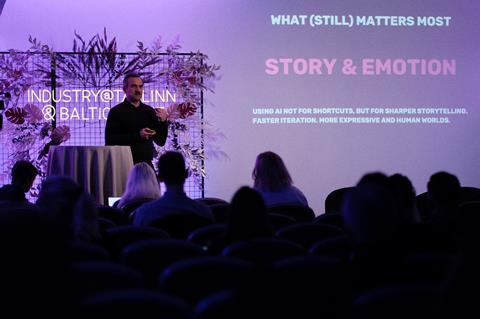
Producers were encouraged to rethink their role in a film industry adapting to artificial intelligence (AI) during a panel covering the new technology at the Industry@Tallinn & Baltic programme.
“The producer’s job is now you have to think like a systems architect,” said Polish-US filmmaker Matt Szymanowski, who is in post-production on a hybrid-AI feature called Captive Mind.
“You have to see the bigger picture and work with the individual talents that have the AI tools, that know the AI tools, as well as these new workflows.”
Szymanowski suggested hybrid AI, where 30-40% of a film is AI-generated, could entirely change the workflow of production in addition to saving on logistics. Referencing the “linear” way films are currently made, he suggested how AI could allow you to add new characters, change worlds and rewrite at any point in the production timeline.
“You can mix up the process, it’s circular, it’s dynamic,” he continued. “It’s a little chaotic, but it is the way of the future.”
The filmmaker also dismissed the notion AI was about making jobs easier. “AI is not about shortcuts,” he stressed. “You may think ‘oh great I can save time and money’. But no, you actually have to work harder to get a better story, to get a human story.”
Using AI authentically
The panel, titled “Moving Forward With AI: Beyond Constraints. Future Scenarios for European Film Productions & Business”, focused on embracing the new technology as opposed to debating its necessity.
Screenwriter Katri Manninen revealed how she uses “AI for everything but writing” so that she can focus on storytelling. “For me, the way I use AI is a way to rise above the generic shit so many people are now generating with AI,” the Finnish writer said.
Some of the things Manninen uses AI for include note-taking as she speaks, providing synopses and summaries that she can send out into the industry, conducting preliminary research, generating images to help visualise an idea, and providing “unblinded” feedback.
She stressed the importance of giving the AI tool a very specific role and clear instructions. “You have to give precise prompting,” Manninen said when discussing synopsis writing. “Tell it [it’s] a copywriter specialised in writing marketing synopses. I often tell it to make sure it’s in the style of the original text so that it has that flair there.”
Elsewhere, script consultant Maciej Zemojcin discussed how authenticity is still essential when using AI. “You don’t just type your story into ChatGPT and it happens. There is no authenticity in that,” he explained. “But if you root in it, if you do it yourself, if you elevate it on this. You work harder and you build on top of that.
“I’m also a big fan of keeping the same budget [that you would have without AI] and building more as opposed to shrinking the budget.”
Zemojcin admitted IP and ownership were “in flux” with regard to AI but that people using the technology authentically will help preserve ownership. “With authenticity, there is authorship connected to it, and with authorship, there is intellectual property connected to it, and there is copyright. All these things are connected,” he explained.

























No comments yet